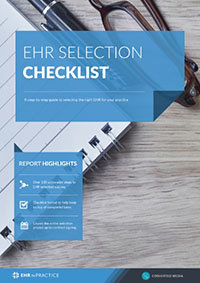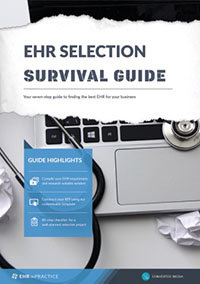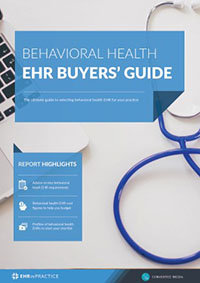Finding the right EHR for a nurse practitioner
Nurse practitioners are a group of health care providers whose numbers have increased significantly for more than a decade. According to the American Academy of Nurse Practitioners Certification Board, there are more than 270,000 nurse practitioners licensed in the U.S. The number of nurse practitioners has more than doubled since 2007. Nurse practitioner-provided health care accounts for an estimated 1.06 billion patient visits made to NPs in 2018.
The state of EHRs for nurse practitioners
When looking at studies examining nurse practitioners and EHR use, one can arrive at the conclusion that problems are present with regard to finding the right EHR for these practices. For example, a study published by the International Medical Informatics Association–Nursing Informatics Special Interest Group indicates nurse practitioners dissatisfaction with EHRs as a consequence of poor fit with clinical workflow, disruptions to productivity, and negative impacts on nurse-patient communication. Overall the results of this study indicate that the nurse-practitioner respondents showed low levels of satisfaction with the current state of EHRs being used in their practices with almost one-third of the respondents stating that the EHR systems they were using did not meet their clinical and administrative needs.
As the role of nurse practitioners grows in our healthcare system the features and functionality the EHR products these providers use has become a topic of discussion. For nurse practitioner practices, what are the considerations when trying to find the right EHR for their practice?
The answer to this question is considered below. Nurse practitioners’ EHR requirements will mirror that of other ambulatory practices. However, when looking at survey research focusing on nurse practitioners’ EHR needs, this population of health care providers will have a more specific set of needs that are unique to nursing.
Recording clinical data
One common concern among nurse practitioners involves the way clinical data is recorded. For example, one common concern among nurse practitioners is that clinical information could not be entered in a narrative or structured format. Allowing information from a patient visit to be entered in a structured, narrative fashion nurse practitioners can better provide the “patient story” which can offer a more nuanced presentation of the patient’s condition as opposed to a less nuanced view presented in inputting data into text boxes.
CMS reporting
According to the 2018 AANP National Nurse Practitioner Sample Survey, 82.9% of full-time nurse practitioners accept Medicare patients and 80.2% accept Medicaid patients. Given the high proportion of Medicare and Medicaid recipients in their patient population, an EHR deployed in these practices will need to be able to collect and track the quality reporting data required by CMS.
E-prescribing
Nurse practitioners, unlike registered nurses, hold prescriptive privileges including controlled substances. The 2018 AANP National Nurse Practitioner Sample Survey showed 95.7% of nurse practitioners prescribe medications, with data showing those in full-time practice write an average of 20 prescriptions per day. As a result, a nurse practitioner EHR should have e-prescribing features and contain the required security features for prescribing controlled substances.
Use our free EHR comparison to compare systems to meet your nurse practitioner's needs
Primary care features
The same study found that 72% of nurse practitioners deliver primary care. As such an EHR used by nurse practitioners should have a library of customized templates that can accommodate the needs of a primary care practice.
Interoperability
As a vast majority of nurse practitioners practice in an ambulatory setting, being able to share clinical data in a seamless manner across care settings is important. The need for interoperability was also noted where survey respondents noted a lack of interoperability. Given how nurse practitioners are often primary care providers, the ability to obtain and share patient data across the care continuum and collaborate with other providers should be viewed as essential.
Practice management and RCM
Nurse practitioners in some states are allowed to own and operate their practice. Just like physicians in the ambulatory care space, a nurse practitioner-owner-operator will need to stay on top of the administrative side of their practice with an integrated practice management system with revenue cycle management capabilities. The importance of enhanced practice management and revenue cycle management capabilities is emphasized even more in competitive markets where providers must compete in areas saturated with ambulatory providers.
Specialty medicine features
Many nurse practitioners serve patients requiring specialty medical services such as pediatrics, women’s health, and internal medicine among others. A nurse practitioner focused EHR should be able to supply templates and other features needed to input and manage clinical data from specialty care.
Mobile and remote capabilities
Nurse practitioners often will be on the move in their practice and will require mobile capability whereby EHR features can be accessed on a tablet or smartphone. Not only does this capability improve workflows it also offers the ability to engage patients on a more personal level. With mobile capabilities nurse practitioners can also face patients and input clinical data from a tablet thereby improving the rapport between patient and provider. Among others in the nursing field, one of the common complaints raised is the fact that their EHR inhibits communication with patients. For example, according to Black Book, 90% of nurses report that their EHR system has negatively impacted communications with their patients, therefore, it is important to consider if the EHR setup with mobile and remote capabilities allows more freedom of movement.
Medical billing
For nurse practitioners who own and operate their own practice billing is an important aspect of operations. In this sense, it is important to select an EHR with advanced billing features that can reduce the risk of billing errors and improve revenue flows.
For nurse practitioners, the process of selecting an EHR will mirror that of other practices in that an assessment of practice requirements will need to be conducted and then a system will need to be selected based on these requirements. However, nurse practitioners, engaged in the process of requirements gathering should be mindful of the fact that general practice EHRs may not be the right fit and that certain nursing specific features may be required.
Free white paper

EHR Selection Checklist
Over 100 actionable steps to EHR selection success

Featured white papers
Related articles
-

5 key stakeholders in your EHR selection
Learn about the individuals that, when consulted early and often, can make your EHR selection pro...
-

5 important areas of EHR training during implementation
Successful EHR implementation is not possible without crucial EHR training
-

Top oncology EHRs to kickstart your selection shortlist
Learn about some of the leading oncology EHR systems on the market including CureMD, ARIA Oncolog...



